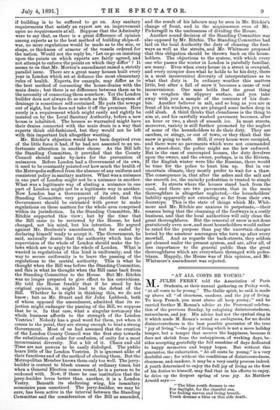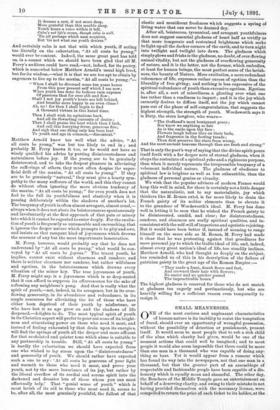"AT ALL COSTS BE YOUNG."
-Ai PILES FERRY told the Association of Paris IN • Students, at their annual gathering on Friday week,
"at all costs to be young." The Gallic spirit, he said, is made up above all " of clearness, candour, and the joy of living.
To keep French, you must above all keep young ; " and he carried further M. Renan's advice at the Provençal celebra- tion of the previous Sunday, by eulogising disinterestedness, naturalness, and joy. His advice had not the cynical ring in it which made M. Renan's sound so ambiguous, for no doubt disinterestedness is the best possible guarantee of the true " joy of living,"—the joy of living which is not a mere holiday temper, but a temper that secures the happiness, because it does not shrink from the unhappiness, of working days, be- sides accepting gratefully the full sunshine of days dedicated to happy memories and happy hopes. But without this guarantee, the exhortation, " At all costs be young," is a very doubtful one; for without the conditions of disinterestedness, clearness, and candour, it may be a very costly process indeed.
A youth determined to enjoy the full joy of living as the first of his duties to himself, may find that in his efforts to enjoy,
he dries up the deepest spring of true joy. As Matthew Arnold says :— "The bliss youth dreams is one For daylight, for the cheerful sun, For feeling nerves and living breath, Youth dreams a bliss on this side death. It dreams a rest, if not more deep, More grateful than this marble sleep. Youth hears a voice within it tell, Calm's not life's crown, though calm is well. 'Tis all perhaps which man acquires, But 'tis not what our youth desires."
And certainly calm is not that with which youth, if acting too literally on the exhortation, "At all costs be young," would ever be content. Indeed, the same great poet has told us, in a sonnet which we should have been glad that all M.
Ferry's auditors could have read,—not, indeed, for its poetry, which is somewhat below Matthew Arnold's usual high level,
but for its wisdom,—what it is that we are too apt to obtain by eagerness to live up to the maxim, " At all costs be young :"— "When I shall be divorced some ten years hence
From this poor present self which I am now; When youth has done its tedious vain expense Of passions that for ever ebb and flow ; Shall I not joy youth's heats are left behind, And breathe more happy in an even clime ? Ah, no ! for then I shall begin to find A thousand virtues in this hated time.
Then I shall wish its agitations back, And all its thwarting currents of desire • Then I shall praise the heat which then I lack, And call this hurrying fever, generous fire; And sigh that one thing only has been lent To youth and age in common,—discontent."
Matthew Arnold knew too well what the advice, " At all costs be young," was but too likely to end in ; and probably M. Ferry knows it too, or he would not have so wisely qualified his advice by putting disinterestedness and naturalness before joy. If the young are to be genuinely
disinterested, and to take the deepest pleasure in alleviating the sufferings of others, they must often despise the super- ficial drift of the maxim, " At all costs be young." If they are to be genuinely "natural," they must give a hearty sym-
pathy to the many sufferers of the world, and this they cannot do without often ignoring the more obvious tendency of the maxim, "At all costs be young;" for even youth does not feel to the fall its youthfulness and elasticity when it is
passing deliberately within the shadows of another's lot. The buoyancy of youth is often almost arrogant, almost cruel, — always when it does not abate its boisterousness spontaneously and involuntarily at the first approach of that pain or misery into which it cannot be expected to enter deeply. For the exulta- tion of youth is frequently so untameable and encroaching, that it ignores the deeper nature which prompts it to pity and awe, and insists on that rampant kind of joyousness which drowns the murmur of any but the most importunate lamentation.
M. Ferry, however, would probably say that he does not understand by "At all costs be young," what would be con- veyed by "At all costs be joyous." The truest youth, he implies, cannot exist without clearness and candour, and there is neither clearness nor candour, but rather wilfulness and egotism, in the boisterousness which drowns every vibration of the minor key. The true joyousness of youth, M. Ferry might say, is a joyousness which is so deep-seated that it can afford to suppress its effervescence for the sake of softening any neighbour's pang. And that is really what the spirit of youth,—not, indeed, in its arrogance, but in its over- flowing generosity, in its abundance and redundance, in its ample resources for alleviating the lot of those who have either been deprived of their youth by misfortune, or who have lost it as age grew on and the shadows of life deepened,—delights to do. The most typical spirit of youth in its Christian aspect will prefer to pour out some of its bright- ness and stimulating power on those who need it most, and instead of feeling exhausted by that drain upon its energies, will find the springs of youth all the deeper and more affluent for that modulated and quieter tone which alone is suitable to any partnership in trouble. Still, "At all costs be young" is hardly the exhortation we should have expected from one who wished to lay stress upon the " disinterestedness" and generosity of youth. We should rather have expected such a one to say : At all costs be generous of your light and warmth to those who need it most, and prove your youth, not by the mere luxuriance of its joy, but rather by the liberal overflow of its cordial and serene spirit into the darkened and drearier lots of those whom you can most effectually help.' That " genial sense of youth " which is most lavish of its aid to those who most need it, seems to be, after all, the most genuinely youthful, the fullest of that elastic and munificent freshness which suggests a spring of living water that can never be drained dry.
After all, boisterous, tyrannical, and arrogant youthfulness does not suggest essential gladness of heart half as vividly as that more temperate and restrained brightness which seeks to light up all the darker corners of the earth, and.to turn night into twilight and twilight into dawn. The gladness which simply glows and frisks is the gladness, no doubt, of over-flowing animal vitality, but not the gladness of overflowing generosity of nature, and it is the latter, not the former, which embodies, at least for human beings, the most perfect sense of the lavish- ness, the bounty of Nature. Mere exultation, a mere redundant vehemence of life, expresses rather excess of egotism than the liberality of free giving; and nothing is less expressive of the spiritual redundance of youth than excessive egotism. Egotism is, after all, a sort of miserliness, a gloating over what one has rather than a readiness to impart ; and it is the joy which earnestly desires to diffuse itself, not the joy which cannot pass out of the phase of self-congratulation, that suggests the
highest strength, the strength of youth. Wordsworth says it is Duty, the stern lawgiver, who wears—
"The Godhead's most benignant grace ; Nor know we anything so fair As is the smile upon thy face : Flowers laugh before thee on their beds, And fragrance in thy footing treads ; Thou dost preserve the stars from wrong, And the most ancient heavens through thee are fresh and strong."
That is only the poet's way of saying that the divine spirit pours itself forth with a far deeper note of eternal gladness, when it obeys the restraints of a spiritual yoke and a righteous purpose, than when it merely represents the irrepressible buoyancy of a vehement individual nature. The gladness of obedience to spiritual law is brighter as well as less exhaustible, than the gladness of personal genius or vivacity.
We wish that the popular advisers of modern France would keep this well in mind, for there is certainly not a little danger that the naturalistic, not to say materialistic, joy which thinkers like M. Renan extol, is far more likely to drain the French gaiety of its nobler elements than to elevate it to the grandeur of Wordsworth's ideal. M. Ferry has done well in letting it be seen that he wished the French gaiety to be disinterested, candid, and clear ; for disinterestedness, candour, and clearness are really spiritual qualities, and in- consistentwith the self-will of imperious and egotistic rejoicing.
But it would have been better if, instead of seeming to range himself on the same side as M. Renan, M. Ferry had made it clear that he was protesting against that greediness for mere personal joy to which the Gallic ideal of life, and, indeed, almost every great nation's ideal of life, too steadily inclines. Matthew Arnold, who had thought so deeply on the subject, has reminded us of this in his description of the failure of patrician gaiety in the great age of the Roman Empire :— " They made a feast, drank fierce and fast, And crowned their hair with flowers; No easier and no quicker passed The impracticable hours."
The highest gladness is reserved for those who do not snatch at gladness too eagerly and pertinaciously, but who are heartily willing for a sufficient reason even temporarily to resign it.











































 Previous page
Previous page